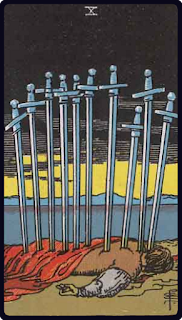
Representing completion; the 10 of Swords is further associated with the consequence of our action and the closure gained from acceptance. In accepting the things, we cannot change we are able to bring an end to the thoughts that surround them giving us the opportunity to move beyond them. The 10 of Swords here therefore represents the absolute completion of conflict.
Where the 9 of Swords represented the paralysing force of negative thought, the 10 of Swords can be seen as forced acceptance, the belief that things cannot get any worse not because we have faith in that belief but simply the product of the inability to see how they could get any worse. In other words, the point at which our despair becomes so deep that literally every possible outcome now appears positive in contrast, no deeper state of negativity exists, or to be quite pointed, absolute rock bottom has been reached.
In the upright state the 10 of Swords asks us to reflect and consider the amount of time we spend thinking about things we cannot change and to determine whether this devotion of energy could be better spent elsewhere and to question whether the devotion of time and energy to those thought processes had any impact at all at lessening or preventing those undesirable outcomes.
In the inverted state the 10 of Swords asks us to consider whether we have accepted the significance of our past and acknowledged the impact it has had; where the upright state reflects on how much time we have spent, the emphasis here is on how little time we have spent trying to compensate and mitigate that negativity or whether we spent our time worrying about the things we could not change without acting, convinced all actions were fruitless endeavours.
Whilst you may not be able to remove a negative influence from your life entirely, those negative influences become easier to tolerate when you have positive influences that can balance your mood, uplift and elevate your mindset, and develop a state of mental resilience. The focus is not to negate what cannot be negated, but to lessen the significance of the loss incurred.
In the Rider-Waite deck the 10 of Swords is the most explicit depiction of consequence; whilst the Hanged Man was figurative in its depiction of consequence, here the depiction is literal, with a body lying on the ground impaled by 10 swords. Who this body belongs to is not clear, it does not appear to be the initiate, but the landscape does appear to be similar to that of the 5 of Swords where the conflict originated, a shoreline before a body of water, they could therefore be the source of inspiration or the mentor who trained the initiate; where we served as our own mentor this could be a figurative depiction of the death of the influence that drove our desires.
The red robe represents nobility, authority, and sacrifice in the name of the greater good. It is also possible here that the figure is the original opponent of the 5 of Swords, ultimately paying the price for the implied execution of the initiate that followed from the 8 of Swords. The 10 of Swords is therefore seen in some interpretations as the depiction of karmic retribution, that we do not need to punish those who trespass against us but instead to have faith that they will be judged in turn.
In self-reflection the 10 of Swords serves as a prompt to consider what your ultimate goal will be in terms of thinking and communication. What do you want to be able to process and respond to on your own, and how do you want to engage with others?
This is your opportunity to reflect on your understanding both of yourself and of others, and to consider whether you have reached a level that you are comfortable with or if you want to know more and go deeper. The emphasis here should be on what remains unknown and uncertain and whether you can dismiss these elements or whether their continued ambiguity might perpetuate anxiety, confusion, and a feeling of disorientation.
Ask yourself “Am I ready for what comes next?” and if the answer is yes then progression is your goal, you have the understanding and skills required to move forward. If the answer is no however, then your goal is to identify the areas of weakness or lack of understanding and take those areas on their own and begin the process again drawing on your experience and understanding that you have gained, employing the tools you have acquired, and identifying the sources of information that you can draw upon – this means separating those elements into their own journey of discovery and applying the Ace of Swords to that journey.

No comments:
Post a Comment
All comments are moderated before they are published. If you want your comment to remain private please state that clearly.